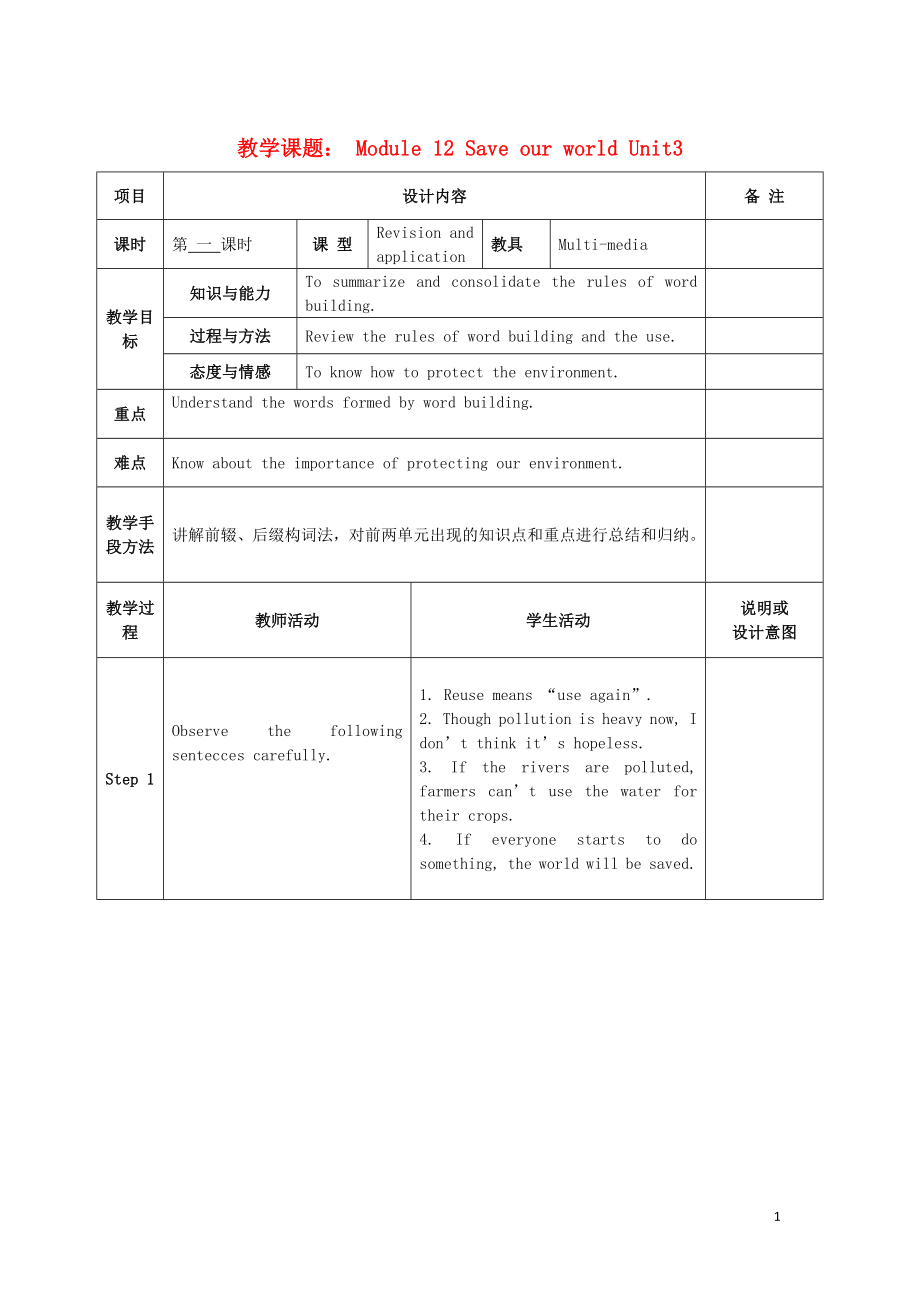《2019學(xué)年九年級英語上冊 Module 12 Save our world Unit 3 Language in use教案 (新版)外研版》由會員分享�,可在線閱讀�,更多相關(guān)《2019學(xué)年九年級英語上冊 Module 12 Save our world Unit 3 Language in use教案 (新版)外研版(5頁珍藏版)》請在裝配圖網(wǎng)上搜索�。
1、教學(xué)課題: Module 12 Save our world Unit3
項目
設(shè)計內(nèi)容
備 注
課時
第 一 課時
課 型
Revision and
application
教具
Multi-media
教學(xué)目標(biāo)
知識與能力
To summarize and consolidate the rules of word building.
過程與方法
Review the rules of word building and the use.
態(tài)度與情感
To know how to protect the environment.
重點
2�、Understand the words formed by word building.
難點
Know about the importance of protecting our environment.
教學(xué)手段方法
講解前輟、后綴構(gòu)詞法�,對前兩單元出現(xiàn)的知識點和重點進行總結(jié)和歸納。
教學(xué)過程
教師活動
學(xué)生活動
說明或
設(shè)計意圖
Step 1
Observe the following sentecces carefully.
1. Reuse means “use again”.
2. Though poll
3�、ution is heavy now, I don’t think it’s hopeless.
3. If the rivers are polluted, farmers can’t use the water for their crops.
4. If everyone starts to do something, the world will be saved.
Step 2
構(gòu)詞法的三種規(guī)則
1.合成法:將兩個或兩個以上獨立且語義不同的單詞合在一起獨立構(gòu)成新詞的方法。
合成名詞:airport, aftern
4�、oon,
合成形容詞:kind-hearted
合成副詞:however, maybe
合成代詞:himself, everyone,
合成動詞:overlook
2.派生法:通過在詞根前面加前綴或在詞根后面加后綴構(gòu)成一個新詞的方法。
dis- 不 disagree, dislike
en- 使……處在某種狀態(tài) enable
im-, in-: 不 impossible, impatient
inter-: 在……之間 international
mis-: 錯誤的 mislead
non-: 不 non-smoker,non-native
re-:再�,重復(fù) rewri
5、te, tetell
un-: 不 unable, unhappy
3.轉(zhuǎn)換法:把一種詞性轉(zhuǎn)化為另一種詞性而詞形不變的方法�。
v.→ n. talk: 談?wù)摗勗?
n→v. water: 水→澆水
adj.→ n. black: 黑色的→黑衣服
Step 3
Make new words. Join the parts of the words in Box A with the words in Box B. you need to use some of the parts more than once.
careful, careless, colle
6、ctable
hopeful, hopeless, impossible
reuse, usable, useful, useless,
unusual, unwanted, wasteful
Step 4
Work in groups.Play the guessing game English for Fun.
1.full of care: careful
2.can be collected: collectable
3.full of hope: hopeful
4.without any hope: hopeful
5.not possible: impos
7�、sible
6. not usual: unusual
7. without any use: useless
8.use again: reuse
9.not wanted: unwanted
10.making a lot of waste: wasteful
Step 5
Complete the sentences with the words in the box.
1. Polluted water is _________.
2. It is _________ to throw so much food away.
3
8、. If you look after things well, you may _______ some of them later.
4. It is _________ to clean up the whole river in such a short time.
5. If we pay attention to pollution now, the future will be _________.
1.healthy 2.wasteful 3.reuse
4.impossible 5.hopeful
Step 6
Complete the table
9�、 in Activity 3.
use—useful / useless—usefully
hope—hopeful / hopeless-hopefully
pollution – pollute—polluted
water –water
waste—wasteful /wasted-wastefully
usual—unusual – usually / unusually
Step 7
Complete the sentences with the correct form of the words in Activity 3.
1. Th
10、e factory ________ the river, and the fish died.
2. We often walk in the countryside. It is a(n) _______ activity for us.
3. Do not use so much water. It is very ________.
4. To keep the flowers growing, you need to _______ them once a day.
1.polluted 2.usual 3.usual
4.water
Step 8
Comple
11�、te the sentenecs in Activity 5.
1. A __________ is a card that you write on one side of and send to someone by post.
2. A __________ is a room where you have classes at school.
3. A __________ is a book that has one or more stories for children.
4. A __________ is a black board that is used at
12、 school for writing on with chalk.
1. postcard 2.classroom
3.storybook 4. blackboard
Step 9
Work in pairs. Look at the pictures and answer the questions.
Possible answers:
1.Cloth, paper, cans, plastic, glass,etc.
2. Recycled paper can be used for notebooks, tickets or writing p
13�、aper.
3. It helps save a lot of resources and reduce greenhouse gas emissions.
4.Yes. I recycled aluminum cans and
Paper by selling them to the recycled factory.
Step 10
Complete the conversation with the correct form of the expressions in the box in Activity 7.
1.worried about
2.throw a
14�、way
3.turn off
4.are good for
Step 11
Listen and check the true sentences.
The true sentences:
2. 3. 5. 6.
Step 12
Listen again and complete the table in Activity 9.
1.glass, plastic and paper, recycle
2. Reuse, take a bag, are hard to
3. reduce pollution,
4.waste electricity,
5.Walk or cycle, pollution
Step
13
Review:
英語中常見的構(gòu)詞法:
1.合成法
2.派生法(加前綴、后綴)
3.轉(zhuǎn)化法(詞性變詞形不變)
Step 14
Homework:
1. Search for more information about pollution. Make an oral presentation to your class.
2. Finish the exercises in Learning English.
課后反思
5
 2019學(xué)年九年級英語上冊 Module 12 Save our world Unit 3 Language in use教案 (新版)外研版
2019學(xué)年九年級英語上冊 Module 12 Save our world Unit 3 Language in use教案 (新版)外研版

